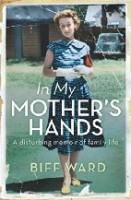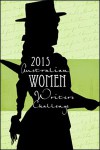Biff Ward, In My Mother’s Hands (Allen & Unwin 2014)
 When my Book Group were picking our next book, someone asked about In My Mother’s Hands, which was on my teetering to-be-read pile. ‘It’s a misery memoir,’ I said, and we moved on to other possibilities
When my Book Group were picking our next book, someone asked about In My Mother’s Hands, which was on my teetering to-be-read pile. ‘It’s a misery memoir,’ I said, and we moved on to other possibilities
I was wrong. There’s misery in it, but there’s a lot else. Biff Ward, born in the early 1940s. gives us a lovingly detailed portrait of family life in suburban, regional and Canberran Australia. Early in the book, she describes how her mother would wash her hair when she was little:
She began by folding a towel around my neck in an efficient, nurse-like manner to stop drips and breakaway runnels creeping down in my neck. The water was a delicious, perfect temperature and it streamed over me. She believed in rubbing the scalp with her strong fingers, making sure not even a tiny spot was missed. I closed my eyes, I gave myself to the warm wetting, the soaping, the rubbing, the rinsing, the divine sense of clean. Next she flopped the towel on my head and scrubbed vigorously before saying, Bend over.
She then wrapped the towel around my head, tight at the neck behind, a turban twist on top like a woman in a magazine, the way I still do today. I walked or sat carefully for five minutes until my hair was dry enough for the towel to come off. Sometimes, she then sat beside me saying, I’ll just give it a bit of a squiggle to get the curls going.
Not a lot of misery in that! I don’t want to give a false impression, though. This benign intimacy is a long way from representative of the mother–daughter relationship at the heart of the book: in fact, it’s a memory that might never have been recalled if it hadn’t been triggered by a companion washing the writer’s hair in her 30s. The passage does illustrate the book’s loving attention to detail, an attention that is shot through not just with the need to tell (a defining feature of misery memoirs?), but also with the need to know, to understand, to deepen the writer’s grasp of things and to take the reader with her.
This could be a beautifully written memoir of any child’s family life from that time and place, except for two major differences. First, this child’s father is Russel Ward, eminent historian, best known for The Australian Legend, a one-time member of the Communist Party, a man of the word. This means that Biff Ward’s recollections and those of the friends and family she interviewed are supplemented by a formidable archive, including numerous public statements made by and about her father, and also his extensive personal correspondence – including agonised letters to his parents about his wife’s condition. Which is the second major difference: her mother, Margaret, was delusional and self-harming, and Biff and her younger brother ‘breathed it in, the irrational in her, the grief in him and the unpredictability all around’.
The book’s title deftly signals a double concern of the book. First, it tells what it was like to grow up in the care – in the hands – of someone who spent most of her time withdrawn into a private world of suffering and delusion, whose behaviour was often bizarre and sometimes deeply alarming, and who may well have drowned her first baby in the bath. Second, it seeks to fathom the story of someone who continually gouges at her hands with sharp implements and keeps the damage hidden by wearing gloves. It’s a book of deep compassion, not just for the mother, but also for the father who, far from faultless, struggles heroically to provide a stable life for his children, while protecting his wife as long as possible from the depredations of the psychiatric profession.
The children felt that the were living with a huge, terrible secret. Perhaps the biggest surprise of the story is the writer’s discovery much later that there was a whole circle of friends who knew the situation, and tried to help in the inarticulate and largely ineffectual way of the time. A fellow academic even wrote a short story based on the Ward family.
This is a truly marvellous book. I ought to say that I have met Biff Ward a couple of times, and have been close to some people who appear in these pages. But the books makes a substantial contribution to our understanding of families, of Australian intellectual history, and of the horrifying ordeal known in the medial profession as mental illness.
 This is the sixth book I’ve read for the 2015 Australian Women Writers Challenge.
This is the sixth book I’ve read for the 2015 Australian Women Writers Challenge.


Haha, Jonathan. You may not have noticed my two recent posts on this book, which my reading group did at the end of March. Not a “misery memoir” at all though it certainly has sadness. I loved your quoting that they ‘breathed it in, the irrational in her, the grief in him and the unpredictability all around’. A perfect description. Wish I’d quoted that in my review! Biff is a delightful woman to meet and we were very lucky to have her at our meeting.
LikeLike
Hi Sue. I hadn’t read your posts. I’m glad I hadn’t because if I had I wouldn’t have wanted to do much more than post a link to you! I think you said everything I tried to only better
LikeLike
Oh no I didn’t … but let’s not have this argument again, because I know I’m right! Anyhow, it’s good for writers like Ward to have multiple original reviews out there.
LikeLike
What can I say but 🙂
LikeLiked by 1 person
Reblogged this on My Bloggerdiok.
LikeLike
Thanks Renny
LikeLike
Reblogged this on Edwina Shaw and commented:
My Uncle Jonathan is a prolific blogger and book reviewer. This book, and his review, were too good not share.
LikeLike
Thanks Edwina. That’s very kind, and already I’ve had traffic from your blog!
LikeLike
Just logged in to see if you’d caught Mrs Gums’ review–I’m a bit behind on reading her blog. Nice to see the dialog here. The durn thing is, she *is* right so often….especially about good books.
LikeLike
Mrs Gums! I haven’t met her but I’m sure she’d be chuffed at the name. And I agree, she’s reliably on the money
LikeLike
Oh you guys, I’m blushing now! But, this blogging thing is fun the way we “meet” people all over the place isn’t it.
LikeLiked by 1 person
Pingback: NSW Premier’s Literary Awards Shortlist announced | Me fail? I fly!
Pingback: April 2015 Roundup: Classics and Literary | New Australian Women Writers Challenge Blog
Pingback: NSW Premier’s Literary Awards night, 2015 | Me fail? I fly!
Pingback: My AWW Year | Me fail? I fly!
Pingback: ‘In My Mother’s Hands’ by Biff Ward | The Resident Judge of Port Phillip
Pingback: Nadia Wheatley, Her Mother’s Daughter | Me fail? I fly!